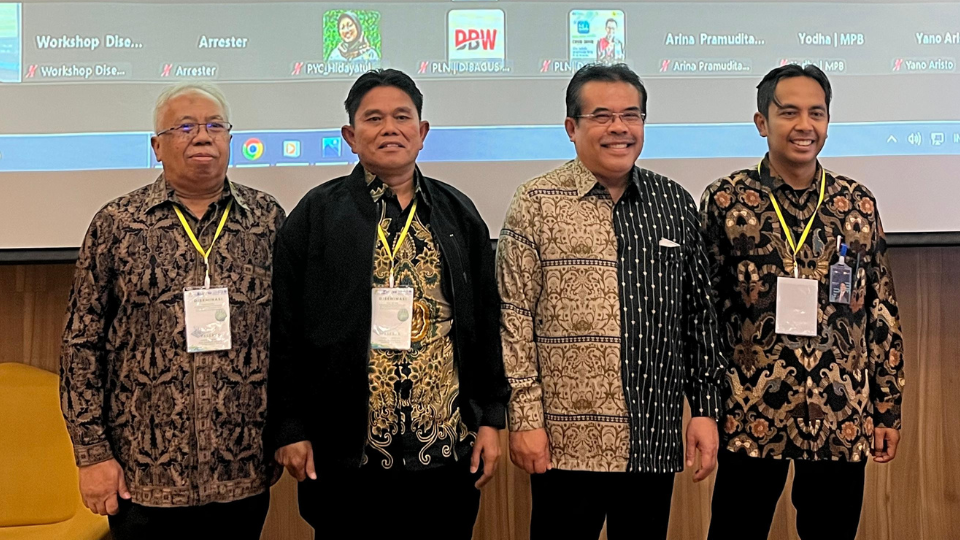To achieve Indonesia’s Net Zero Emission (NZE) 2060 target, PT PLN (Persero) has collaborated with the SBM ITB, and LAPI ITB to conduct an in-depth study on the roadmap for power plant engineering and new renewable energy (EBT) development. This study highlights the key challenges and strategies in Indonesia’s energy transition.
“To reach NZE 2060, we must ensure that technology, business, and human resources progress in tandem. However, Indonesia’s technology remains behind that of other countries, making this transition a long-term process,” said Prof. Dermawan Wibisono, Head of the SBM ITB Study Working Team, during an in-depth study workshop at the Freeport Building, SBM ITB, Bandung (6/2).
A similar concern was echoed by Prof. Purnomo Yusgiantoro, Special Advisor to the President for Energy, who emphasized the urgency of achieving the NZE target amid rising CO₂ emissions and energy consumption.
“As of 2023, approximately 77% of Indonesia’s total energy supply still comes from fossil fuels, with coal being the largest contributor. This reflects our heavy dependence on fossil energy,” he said.
According to Didik Fauzi Dakhlan, EVP of Asset Management, Engineering, and Integrated Management Systems at PT PLN (Persero), a well-structured power plant engineering roadmap supports the energy transition. While PLN remains committed to NZE 2060, the challenge lies in transitioning from fossil fuels to renewable energy while maintaining electricity supply stability. One of the main obstacles in this process is technology and infrastructure readiness.
“Currently, renewable energy contributes only 11-13% of the total national energy supply, far from our 2025 target of 23%. This underscores the need to accelerate the development of renewable energy sources, such as solar power, geothermal, and nuclear energy,” Didik stated.
To address this challenge, PLN recognizes that it cannot work alone. Collaboration with institutions possessing expertise in renewable energy—such as SBM ITB and LAPI ITB—is crucial.
Beyond technological hurdles, the environmental impact of renewable energy projects must also be considered. PLN ensures that every new energy initiative undergoes a feasibility study and environmental impact assessment.
“In Cirata, for instance, hydroelectric power plants are integrated with floating solar panels to maximize land use efficiency. Additionally, we have implemented a Battery Energy Storage System (BESS) to ensure electricity stability in remote areas,” Didik explained.
He emphasized that all technology implementations undergo rigorous regional surveys to prevent public opposition and ensure the smooth adoption of renewable energy solutions.
The NZE roadmap implementation will be continuously monitored through clear success indicators, ensuring the primary objectives are met.
“For instance, our target of achieving a 23% renewable energy mix by 2025 must be met to keep the long-term NZE 2060 vision on track,” Didik noted.
He also highlighted the critical role of engineering in the planning and execution of new energy infrastructure. According to him, success in energy transition depends equally on engineering design (⅓), construction (⅓), and maintenance (⅓).
“This roadmap is crucial to ensuring a sustainable energy transition,” he said.
Prof. Dermawan Wibisono believes nuclear energy could accelerate the energy transition, but human resource readiness remains a decisive factor.
“We must ensure that Indonesia’s workforce is well-prepared in terms of expertise, attitude, and discipline in managing nuclear power plants,” he emphasized.
This study underscores that achieving NZE 2060 is a complex yet achievable goal through government, industry, academia, and society collaboration. With a structured engineering roadmap, PLN aims to overcome technological and infrastructure challenges while opening new investment opportunities in the renewable energy sector.
The success of this roadmap will depend on the synergy between policies, technological innovation, and human resource readiness to adapt to major shifts in the national energy system. With the right steps, Indonesia has the potential to achieve its NZE 2060 goal creating a cleaner, more efficient, and sustainable energy system.





